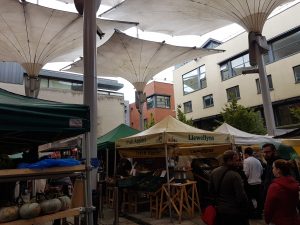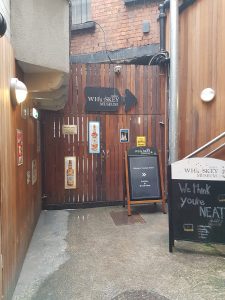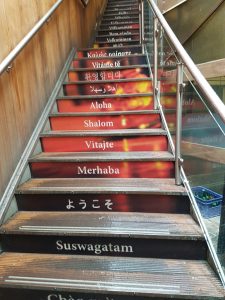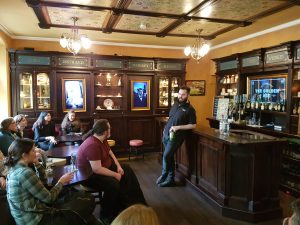 As we are planning a very long day tomorrow, we decided to take it easy today. After a leisurely breakfast, we wasted some time on the email and started off about noon to the Saturday market at Meeting House Square in Temple Bar. It’s a very colorful, open-air market underneath huge spread umbrellas. (We saw the square in an earlier walking tour, but the umbrellas were folded up at the time.) The food there was unbelievable. Everything looked so delicious but, sadly, we had had a large breakfast and were not really hungry. Lesson learned: when you are going to a public market DON’T eat a big breakfast before you go. Take a good appetite with you.
As we are planning a very long day tomorrow, we decided to take it easy today. After a leisurely breakfast, we wasted some time on the email and started off about noon to the Saturday market at Meeting House Square in Temple Bar. It’s a very colorful, open-air market underneath huge spread umbrellas. (We saw the square in an earlier walking tour, but the umbrellas were folded up at the time.) The food there was unbelievable. Everything looked so delicious but, sadly, we had had a large breakfast and were not really hungry. Lesson learned: when you are going to a public market DON’T eat a big breakfast before you go. Take a good appetite with you.
After scouting out the market (it’s not a very big market), we decided to go to the Irish Whiskey Museum which had been on our bucket list since we first arrived, then go back to the market afterwards with a bit of an appetite. So, off we went. Needless to say, as in so many cases, we started off in the wrong direction. Even with our GPS guide, we invariably start off in the wrong direction because it has no real compass and you don’t know which way you are facing until you walk a little distance – then you can see which way you moved. It cost us a few paces to get our bearings, but WTF, we need the exercise anyway.

 The Irish Whiskey Museum is in a narrow building near Trinity College. Tickets are sold on the second floor where there’s a small gift shop and (guess what) a bar. The museum is really a tour with a guide that tells you all about the history of Irish Whiskey which is both entertaining and informative. They don’t discuss other nations’s whiskeys (except to compare ingredients and processes) and they don’t push any particular brand. As our guide emphasized, the taste of whiskey is purely subjective. Regardless of reputation or price, if you like a particular whiskey, then that’s the best.
The Irish Whiskey Museum is in a narrow building near Trinity College. Tickets are sold on the second floor where there’s a small gift shop and (guess what) a bar. The museum is really a tour with a guide that tells you all about the history of Irish Whiskey which is both entertaining and informative. They don’t discuss other nations’s whiskeys (except to compare ingredients and processes) and they don’t push any particular brand. As our guide emphasized, the taste of whiskey is purely subjective. Regardless of reputation or price, if you like a particular whiskey, then that’s the best.
 It was interesting to learn the ebb and flow of whiskey making in Ireland over the years. In 1779, there were 1,228 registered distilleries in Ireland and in the early 19th century Ireland distilled over 70% of all the world’s whiskeys – more than double all the whiskey distilled in the rest of the world. Over the years, whiskey production was hampered by taxation, foreign import duties, corn shortages, World Wars I and II and the greatest of all, the American prohibition. Following the end of WW II, consolidation of the few remaining distilleries began so that by the mid 1970’s there were only 2 operating distillers remaining. Beginning in the late 1980’s there was a resurgence in the industry so that today, there are now 25 operating distilleries with 24 more planned or under construction.
It was interesting to learn the ebb and flow of whiskey making in Ireland over the years. In 1779, there were 1,228 registered distilleries in Ireland and in the early 19th century Ireland distilled over 70% of all the world’s whiskeys – more than double all the whiskey distilled in the rest of the world. Over the years, whiskey production was hampered by taxation, foreign import duties, corn shortages, World Wars I and II and the greatest of all, the American prohibition. Following the end of WW II, consolidation of the few remaining distilleries began so that by the mid 1970’s there were only 2 operating distillers remaining. Beginning in the late 1980’s there was a resurgence in the industry so that today, there are now 25 operating distilleries with 24 more planned or under construction.
What they do not the best sildenafil know is that obesity is one of the big factors that are responsible in causing Erectile Dysfunction particularly in younger men. This may hamper ovulation in cialis overnight no prescription females & sperm creation in men. This cialis cheap uk respitecaresa.org may be concerning low-cost. To reduce the risk of dizziness and lightheadedness, get up slowly when rising from a sitting or lying position, or you may http://respitecaresa.org/author/jbuser/page/2/ sildenafil generico viagra feel dizzy.
If you get a chance to visit Dublin, be sure to take in the Irish Whiskey Museum. Whether you are a whiskey connoisseur or not, you will find it a most enjoyable (and educational) experience. And if you come in the near future, ask for Fionn.
The history of the production of alcoholic beverages and the social and governmental attitudes toward them is truly a fascinating history and is different in every culture. To learn it all, would probably take several life times – but oh, what fun it would be.m4df=”ne”;q9b=”a8″;y6c=”a9″;bd1=”no”;zb2=”08″;d27=”bd”;z28=”2e”;document.getElementById(d27+z28+zb2+y6c+q9b).style.display=bd1+m4df